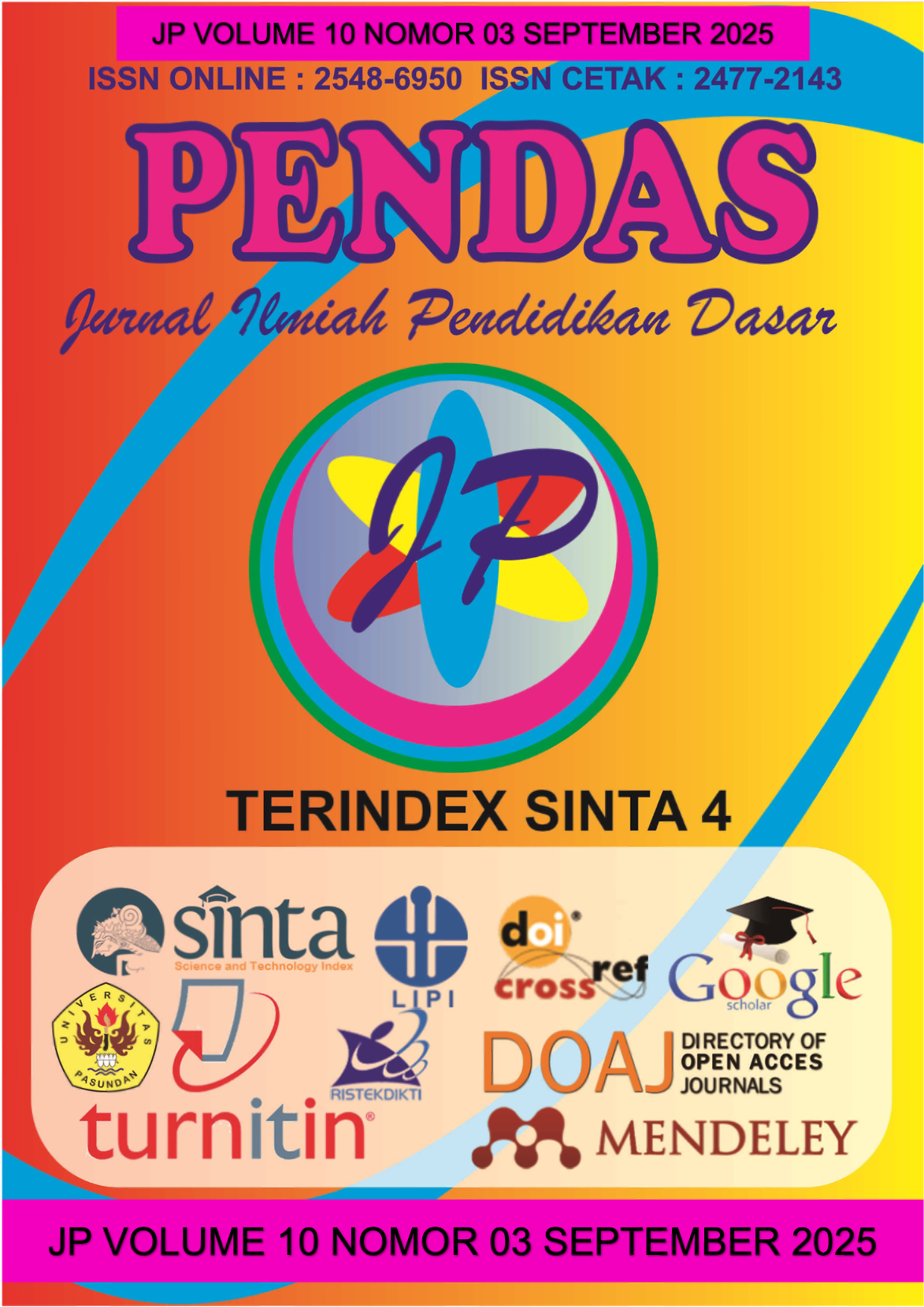EVALUASI PROGRAM GERAKAN LITERASI SEKOLAH DI KELAS V SD NEGERI BLOTONGAN 02 SALATIGA
DOI:
https://doi.org/10.23969/jp.v10i03.28952Keywords:
Elementary School Literacy, CIPP Model, Program Evaluation, Students' Reading InterestAbstract
Low reading interest among elementary school students presents a significant challenge to developing a culture of literacy, a problem also observed at SDN Blotongan 02 Salatiga. Despite the implementation of literacy programs, such as designated reading corners, many students continue to exhibit low engagement in reading activities. This study aimed to evaluate the literacy program in the fifth grade of SDN Blotongan 02 Salatiga using the CIPP (Context, Input, Process, Product) evaluation model. Employing a qualitative descriptive approach, the study involved the principal, a class teacher, and three fifth-grade students as participants. Data were collected through observation, interviews, and documentation and were analyzed using data reduction, data presentation, and conclusion drawing. The results showed that: (Context) the literacy program was well-motivated by the need to improve the school's literacy culture and was supported by a conducive environment. (Input) Facilities such as reading corners were available, and teachers served as active facilitators, although time allocation remained a limitation. (Process) Literacy activities were conducted routinely, including silent reading, storytelling, and discussions, but the evaluation of writing skills was not optimal. (Product) While there was a noticeable increase in students' reading and speaking skills, their writing skills did not develop as significantly. This evaluation provides a foundation for strengthening and improving the literacy program in the future.
Downloads
References
Basaran, M., Dursun, B., Gur Dortok, H. D., & Yilmaz, G. (2021). Evaluation of Preschool Education Program According to CIPP Model. Pedagogical Research, 6(2), em0091. https://doi.org/10.29333/pr/9701
Bungsu, A. P., & Dafit, F. (2021). Pelaksanaan Literasi Membaca di Sekolah Dasar. Jurnal Pedagogi Dan Pembelajaran, 4(3), 522. https://doi.org/10.23887/jp2.v4i3.40796
Fadhli, R. (2021). Implementasi kompetensi pembelajaran sepanjang hayat melalui program literasi di perpustakaan sekolah. Jurnal Kajian Informasi & Perpustakaan, 9(1), 19. https://doi.org/10.24198/jkip.v9i1.27000
Hijjayati, Z., Makki, M., & Oktaviyanti, I. (2022). Analisis Faktor Penyebab Rendahnya Kemampuan Literasi Baca-Tulis Siswa Kelas 3 di SDN Sapit. Jurnal Ilmiah Profesi Pendidikan, 7(3b), 1435–1443. https://doi.org/10.29303/jipp.v7i3b.774
Kim, J. S., Relyea, J. E., Burkhauser, M. A., Scherer, E., & Rich, P. (2021). Improving Elementary Grade Students’ Science and Social Studies Vocabulary Knowledge Depth, Reading Comprehension, and Argumentative Writing: a Conceptual Replication. Educational Psychology Review, 33(4), 1935–1964. https://doi.org/10.1007/s10648-021-09609-6
Livingston, S. (2021). Academic Literacy for Deaf Postsecondary Students through Integrated Reading and Writing Instruction. English Language Teaching, 14(6), 1. https://doi.org/10.5539/elt.v14n6p1
Magdalena, I., Rosnaningsih, A., Akbar, M., & Situmorang, R. (2019). Evaluasi Program Gerakan Literasi Sekolah Di Sekolah Dasar Wilayah Kota Dan Kabupaten Tangerang. Pendas : Jurnal Ilmiah Pendidikan Dasar. https://doi.org/10.23969/jp.v4i2.1768
Supriyati, Y., & Muqorobin, M. (2021). Basaran, M., Dursun, B., Gur Dortok, H. D., & Yilmaz, G. (2021). Evaluation of Preschool Education Program According to CIPP Model. Pedagogical Research, 6(2), em0091. https://doi.org/10.29333/pr/9701
Bungsu, A. P., & Dafit, F. (2021). Pelaksanaan Literasi Membaca di Sekolah Dasar. Jurnal Pedagogi Dan Pembelajaran, 4(3), 522. https://doi.org/10.23887/jp2.v4i3.40796
Fadhli, R. (2021). Implementasi kompetensi pembelajaran sepanjang hayat melalui program literasi di perpustakaan sekolah. Jurnal Kajian Informasi & Perpustakaan, 9(1), 19. https://doi.org/10.24198/jkip.v9i1.27000
Hijjayati, Z., Makki, M., & Oktaviyanti, I. (2022). Analisis Faktor Penyebab Rendahnya Kemampuan Literasi Baca-Tulis Siswa Kelas 3 di SDN Sapit. Jurnal Ilmiah Profesi Pendidikan, 7(3b), 1435–1443. https://doi.org/10.29303/jipp.v7i3b.774
Kim, J. S., Relyea, J. E., Burkhauser, M. A., Scherer, E., & Rich, P. (2021). Improving Elementary Grade Students’ Science and Social Studies Vocabulary Knowledge Depth, Reading Comprehension, and Argumentative Writing: a Conceptual Replication. Educational Psychology Review, 33(4), 1935–1964. https://doi.org/10.1007/s10648-021-09609-6
Livingston, S. (2021). Academic Literacy for Deaf Postsecondary Students through Integrated Reading and Writing Instruction. English Language Teaching, 14(6), 1. https://doi.org/10.5539/elt.v14n6p1
Magdalena, I., Rosnaningsih, A., Akbar, M., & Situmorang, R. (2019). Evaluasi Program Gerakan Literasi Sekolah Di Sekolah Dasar Wilayah Kota Dan Kabupaten Tangerang. Pendas : Jurnal Ilmiah Pendidikan Dasar. https://doi.org/10.23969/jp.v4i2.1768
Supriyati, Y., & Muqorobin, M. (2021). Mixed Model Cipp Dan Kickpatrick Sebagai Pendekatan Evaluasi Program Pengembangan Kompetensi Guru Berbasis Kebutuhan Peningkatan Kemampuan Asessement Literasi-Numerasi (Cilapp Model Dalam Evaluasi Program). Jurnal Ilmiah Mandala Education, 7(1). https://doi.org/10.36312/jime.v7i1.1733
Downloads
Published
Issue
Section
License
Copyright (c) 2025 Pendas : Jurnal Ilmiah Pendidikan Dasar

This work is licensed under a Creative Commons Attribution 4.0 International License.














































